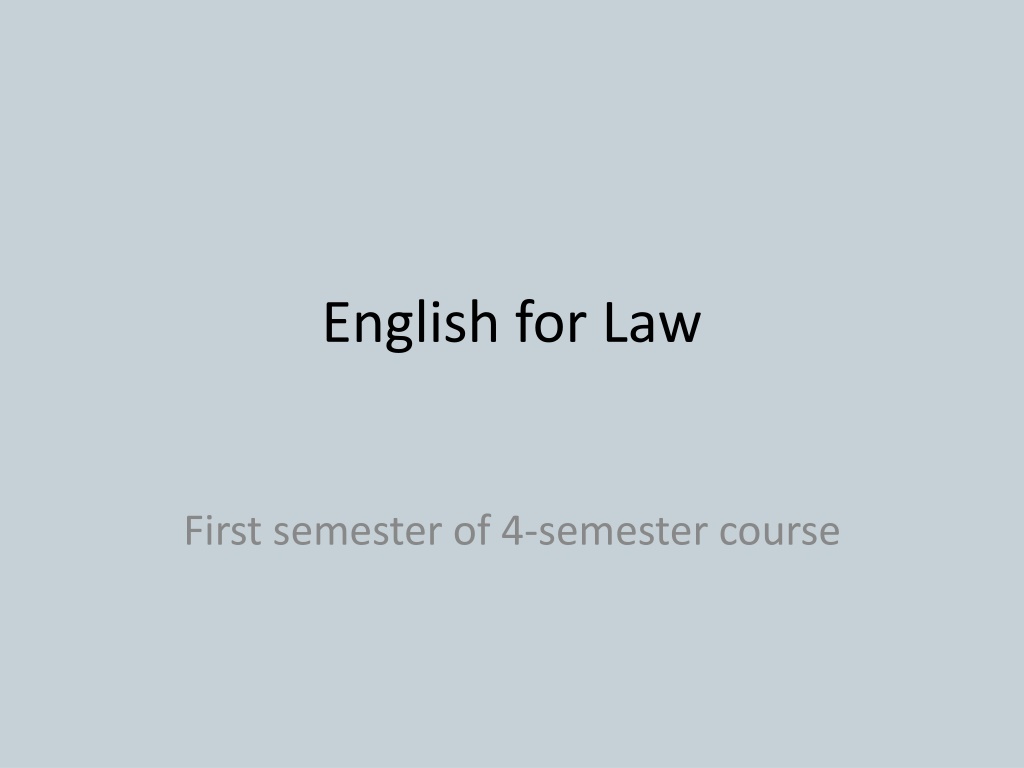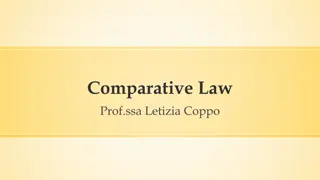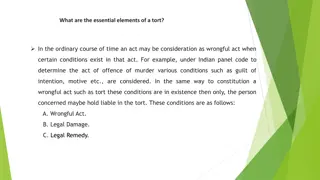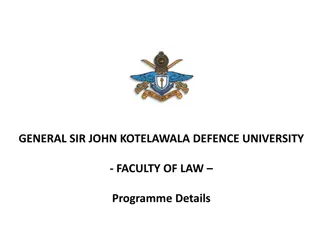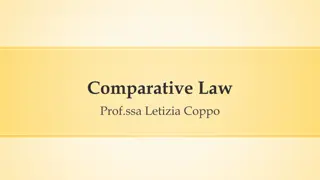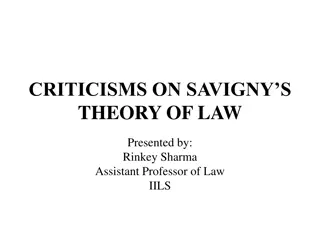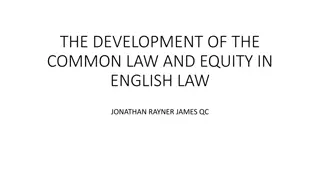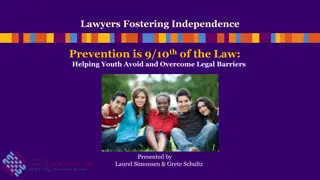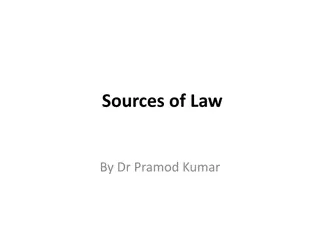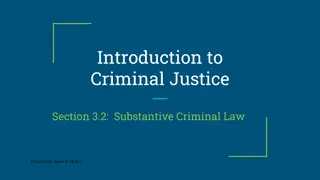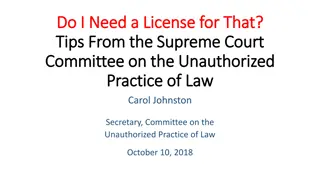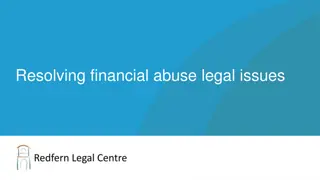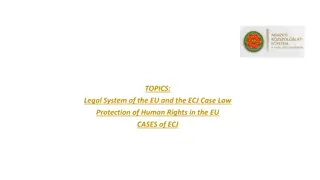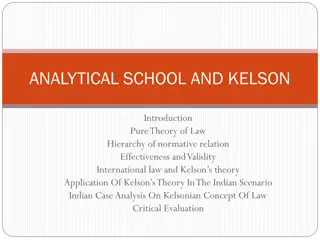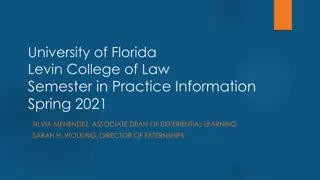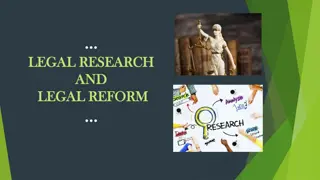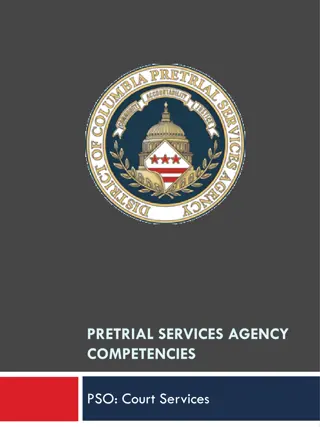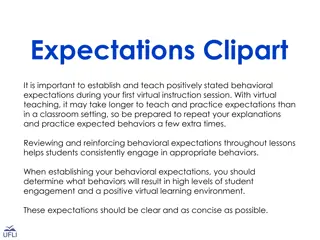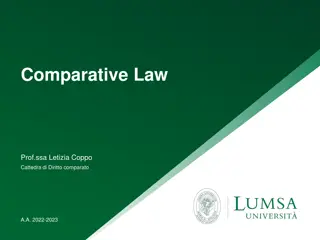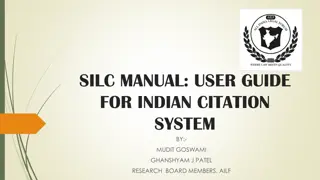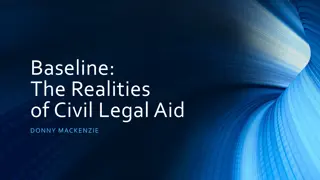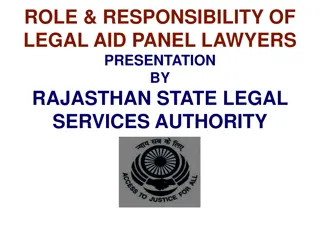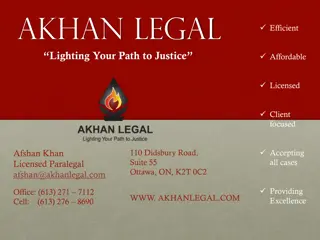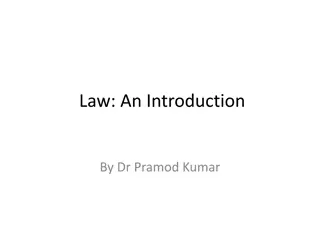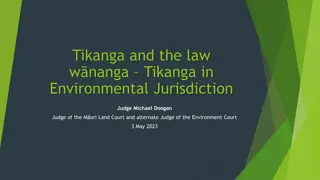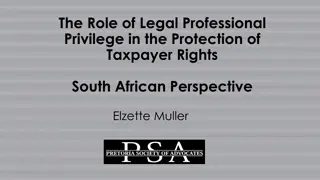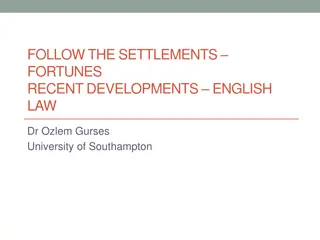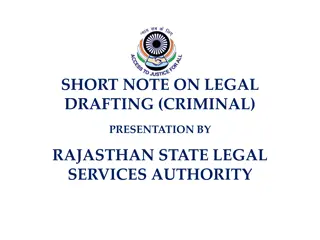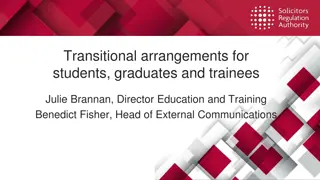Understanding Legal Studies and Expectations in English for Law Course
Explore the motivations behind studying law, objectives of law students, skills expected from lawyers, and subjects in the first year of a legal studies program. Discover what to expect in a Legal English class and the practical applications of language skills in the legal field.
Download Presentation

Please find below an Image/Link to download the presentation.
The content on the website is provided AS IS for your information and personal use only. It may not be sold, licensed, or shared on other websites without obtaining consent from the author. Download presentation by click this link. If you encounter any issues during the download, it is possible that the publisher has removed the file from their server.
E N D
Presentation Transcript
English for Law First semester of 4-semester course
Who are you studying with? Introductory ice breaker 1. Form groups of 3 2. Make guesses about your group members and jot them down 3. Compare your guesses with the reality
Your expectations - What do you expect to do in Legal English class and at home? - What do you expect to use English for while at the Faculty and later when you practice law? - What do you WANT to do and what langaugae skills do you feel you NEED to practice?
And what we are actually going to do in class Information in Osnova https://is.muni.cz/auth/el/1422/podzim2014/MP111Z/index.qwarp Course requirements: credit for attendance, active participation, compulsory written assignment + passing a credit test Credit test translation of legal phrases (Czech English, English-Czech, 3 definitions, 2 questions about course content example: in the IS (Osnova Revision)
Povinn: V osnov p edm tu: https://is.muni.cz/auth/el/1422/podzim2014/MP111Z/index.qwarp Bring the materials to the lessons! - changes by email Doporu en : Chrom , Marta. Anglicko- esk pr vnick slovn k. English-Czech law dictionary. Leda, 1997. Chrom , Marta. esko-anglick pr vnick slovn k. Czech -English law dictionary. Leda, 2001. Chrom , Marta. New introduction to legal English. Revised Ed. Volume I. Univerzita Karlova, 2011. Chrom , Marta. New introduction to legal English. Revised Ed. Volume II. Univerzita Karlova, 2011. Powell, Richard. Law today. 1. ed. Harlow : Longman, 1993. Krois-Lindner, Amy Firth, Matt. Introduction to International Legal English. CUP, 2008.
Legal Studies a) What might be the reasons or motivation for the undergraduates to have decided to study law? b) What are the usual objectives the law students want to achieve? c) What are the lawyers required and expected to be able to do? d) What will the law degree equip you for? e) What are the compulsory and optional subjects you have to study in the first year? Describe one of them. f) List some other subjects you are going to study at the Faculty of Law in Brno.
Listening: Should I go to law school? Yourself/ In your opinion Recording Why do I want to become a lawyer? I want to practice law. intellectual stimulation improving critical thinking sharpening attention to detail What are the benefits for any student? Is a law degree a ticket to any profession? No, otherwise the speaker would be an astronaut or a plumber.
What is law? a) Give examples how our behavior is regulated by rules. - there are informal social rules, formal rules of institutions, laws created by the government b) What happens if somebody breaks a law? - he/she can be punished (civil action: compensation, criminal action: fine, prison, ) c) Give at least three reasons why we need law. - to resolve disputes, to ensure peaceful society, to respect human rights, to ensure equality,
What is law Collocations to break laws/duties to settle disputes to carry out duties to resolve disputes to respect rights/laws/duties
What is law Group work: Create your definition of law. people enforce power reason rules society authority oppression morality body system control relations regulate conduct customs govern
Definitions of law a) A body of rules fixed and enforced by a sovereign political authority. b) Law is a tool of oppression used by capitalists to control the proletariat. c) An embodiment of Reason , whether in the individual or the community. d) Law is the formal glue that holds fundamentally disorganised societies together. e) LAW: (1) a binding custom or practice of a community: a rule of conduct or action prescribed or formally recognized as binding or enforced by a controlling authority (2) the whole body of such customs, practices, or rules John Austin Marxist theory Plato Thomas Hobbes Merriam-Webster English Dictionary
Definition of law law Pronunciation: /l / noun 1 [mass noun] (often the law) the system of rules which a particular country or community recognizes as regulating the actions of its members and which it may enforce by the imposition of penalties: shooting the birds is against the lawthey were taken to court for breaking the law[as modifier]: law enforcement [count noun] an individual rule as part of a system of law: a new law was passed to make divorce easier and simpler systems of law as a subject of study or as the basis of the legal profession: he was still practising law [as modifier]: a law firm,law students something regarded as having binding force or effect: he had supreme control what he said was law (the law) informal the police: he d never been in trouble with the law in his life 2 a rule defining correct procedure or behaviour in a sport: the laws of the game 3 a statement of fact, deduced from observation, to the effect that a particular natural or scientific phenomenon always occurs if certain conditions are present: the second law of thermodynamics
Language Practice Exercise 7.1 Be careful about the Czech term pr vo . It is translated into English in two different ways depending on its nature: objektivn pr vo , e.g. pr vo t to zem is translated as ____________ subjektivn pr vo , e.g. m pr vo volit is translated as ____________ RIGHT LAW
Language Practice Exercise 7.2 a) Law is a living and dynamic system. b) The right to life is a fundamental/basic human right. c) He has read the patient rights and responsibilities/duties. d) Law is enforceable and binding.
Language Practice law lawful X unlawful lawfully X unlawfully law legal X illegal legally X illegally legal 1 relating to the law, required by the law 2 permitted by law lawful conforming to, permitted by, or recognized by law
Legal Practice Exercise 7.4 legal a) He asked for _______________ advice. b) Their activities were unethical and _______________. c) The man was _______________ killed. d) What makes people cross the border _________________? e) There s nothing wrong with my behaviour, it s perfectly _______________. unlawful/illegal unlawfully illegally/unlawfully legal/lawful
law collocations natural law, contract law, banking law, taxation law, company law, labour law, family law, welfare law, a new law law theory, law schools, law department, law enforcement, a law firm legal education, legal system, legal practitioners, legal profession to make the law, to study law, to break the law, to pass the law, to practice law, to apply the law, to propose a new law
law collocations the law regulates, the law provides, the law applies to the law of a community, the laws of the game, the laws of thermodynamics, the law of the country philosophy of law, a system of law within the law, by law,according to the law, to be against the law
